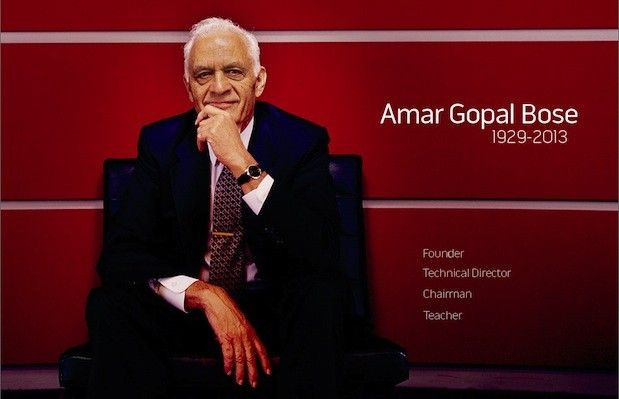Amar Bose, Pioneer Of High Fidelity Sound Technology And Inventor Of Bose Speakers, Dies At 83

His last name is synonymous with high-quality speakers and his inventive nature made him a pioneer in high-quality audio technologies — Amar Bose. Yesterday, at the ripe old age of 83, Bose passed away in Wayland, Mass.
The cause of death is not confirmed as yet.
A self-made billionaire and Fulbright scholarship recipient, Bose started his business while studying at M.I.T. as an engineering student in the 1950s. After purchasing a new stereo system and realizing that the sound quality failed to reproduce the realism of a live performance he decided that he would make a speaker system that would produce the sound quality of a symphony.
"I loved music, and in my ninth year at M.I.T., I decided to buy a hi-fi set. I figured that all I needed to do was look at the specifications. So I bought what looked like the best one, turned it on, and turned it off in five minutes, the sound was so poor," Bose said in an interview with Discover. "I was so curious to find out why. In the spring of 1956, I went to India to teach on a Fulbright scholarship, and I read about acoustics at night. In a concert hall, only a tiny bit of the sound comes to you directly; most of it arrives after many reflections from the surfaces of the room."
He founded the Bose Corporation in 1964, and over the past 49 years, the company has led the way for sound enhancing technology. Bose's interest in electronics started from a very young age. After borrowing a radio transmitter from a fellow boy scout, he learned how to read schematic circuitry drawings. He quickly acquired the ability to fix anything electronic. To earn money, Bose then started his own radio repair business when he was in high school.
In 1968, Bose began selling his first speaker system, the Bose 901 Direct. Over the next 25 years this became a bestseller and success became all too real for Bose.
However, the path to success was not easy for Bose.
"There were a couple of times when we were within two weeks of being nonexistent," said Bose. We passed narrowly over the fire."
Later inventions included the popular Bose Wave radio and the Bose noise-canceling headphones, which are now used for military and commercial pilots. The Bose corporation has also created sound systems for the Staples Center in Los Angeles, the Sistine Chapel, Mercedes Benz, and a number of other corporations.
Bose taught at M.I.T. from 1956 until 2001. He received the Baker Teaching Award and later M.I.T.'s School of Engineering established the Bose Award for Excellence in Teaching to recognize outstanding faculty contributions to undergraduate education. M.I.T. President L. Rafael Reif called Bose "an extraordinarily gifted leader."
In 2011, Bose gave M.I.T. the majority of Bose Corp. stock in the form of non-voting shares, with 100 percent of the company's profits go into research — a passion to which Bose devoted his life.
His father, Noni Gopal Bose escaped India in the 1920s after persecution from the British rule. According to Bose, his father came to America with five dollars in his pocket. Amar Bose was born and raised in Philadelphia, by his father and mother, a schoolteacher. Bose is survived by two children, Vanu and Maya from his first wife, and his second wife, Ursula Boltzhauser.
"While my father is well known for his success as an inventor and businessman, he was first and foremost a teacher," said his son Vanu Bose, "I could not begin to count the number of people I've met who've told me that my father was the best professor they ever had.



























